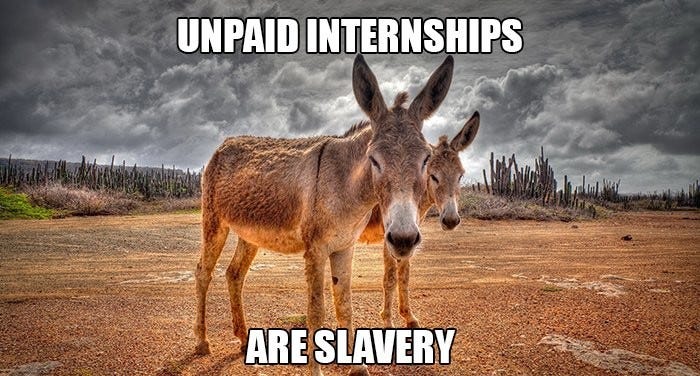Addressing the Need for Intern and Trainee Protection Laws in India: A Legal Perspective
In the tenth post of CASLW's Shram looks into the dire need of coming up with legislation to safeguard and foster interns.
Introduction
Internships and trainee programs have become integral to the career development of students and young professionals in India. They play a crucial role in bridging the gap between academic learning and practical experience. In India, as in many other countries, a substantial number of students and young professionals participate in internships and trainee programs to gain valuable insights into their chosen fields.
However, the absence of dedicated intern and trainee protection laws has often left these individuals vulnerable to exploitation and mistreatment. There is a pressing need for the establishment of comprehensive intern and trainee protection laws in India to safeguard the rights and interests of these individuals.
Absence of Intern Protection Labour Legislations
Interns working in the service sector are not covered by labor laws. The initial International Labour Conference adopted international labor conventions addressing various aspects such as working hours, unemployment, minimum age, and night work for women and young individuals. However, these conventions do not extend to interns due to the absence of statutory provisions.
The Apprentices Act of 1961 aims to offer practical training to technically qualified individuals in various trades, including engineers and diploma holders. However, its application is limited to specific areas and industries designated by the Central government. This act does not grant legal recourse, bonuses, or incentives to apprentices during their training period (as per Section 1(4)).
The Industrial Employment (Standing Orders) Act of 1946 mentions apprentices but is applicable only to industrial establishments with 100 or more workers. While this act provides legal recourse for issues like removal from service, it does not afford apprentices the same protections as permanent workers. It remains unclear whether The Factories Act of 1987 applies to interns.
On January 10, 2020, the Delhi High Court acknowledged that these internships place undue pressure on students who may lack the means to secure them. In a suo motu order, a Division Bench comprising Justices Siddharth Mridul and Najmi Waziri assured that both the Bar Council of India and the institutions where students are enrolled would be responsible for providing internship opportunities in line with BCI guidelines. However, the order did not address the regulation of such internships.
Common Issues faced by Interns and Trainees
Unpaid or underpaid internships
Lack of job security
Long working hours
Limited access to training
MD Imran Ahmad v. Union of India WP(C) 1120/2021- A Question of Intern's Fundamental Rights, Left Unanswered
In this context, MD Imran Ahmad filed a writ petition in the Supreme Court (SC) with the aim of recognising interns as trainees and affording them legal protection under the Apprentices Act of 1961. Unfortunately, on January 6th, the SC dismissed this petition.
The petitioner's primary concern revolved around the exploitation of interns, as internship providers often make them work longer hours than regular employees, taking advantage of the gaps in labor and trainee laws that do not extend to interns. Interns are even compelled to work on Sundays and holidays, which not only infringes upon their constitutionally guaranteed fundamental rights, including Articles 21 and 23, but also poses risks to their physical and mental well-being.
In several instances, interns have effectively replaced or are replacing regular employees while receiving no stipend in return. Such practices amount to a violation of Article 14 of the Indian Constitution. Additionally, the petitioner sought remedies that included:
Establishing a transparent and fair selection process for interns in both the private and government sectors to ensure equal opportunities for all.
Providing accommodation and necessary support systems for disabled individuals during their internships and implementing reservation policies available to disabled persons in internships, similar to those applied in jobs and education.
Implementing a prompt grievance redressal mechanism for interns who believe they have been exploited or harassed during their internship.
Setting limits on the number of interns an organization can have concurrently and the duration of internships.
Ensuring that interns do not replace regular employees and prohibiting job advertisements that promote employment below the prescribed minimum age, including those by the government
A Critique of the MD Imran Order- Why must Unpaid Internships be made Unconstitutional?
Application of the Principle of 'Quantum Merit'
"Quantum Meruit" is a Latin expression linked to the Indian Contract Act of 1872. It essentially signifies "what one has legitimately earned" or "the actual worth of services provided." Put simply, it refers to the genuine value of services or goods provided.
This concept supports fairness between parties and ensures that if an individual delivers a service or product, they should receive the agreed-upon benefits. Conversely, if someone receives nothing for their efforts, they have the option to seek a remedy by filing a lawsuit based on quantum meruit. Therefore, considering that the MD Imran order contradicts principles of natural justice (quantum meruit) and potentially infringes upon fundamental rights (Art. 14 and 21), it should be overturned, and labor laws protecting interns should be established in India.
Conclusion & Suggestions
Unpaid internships pose potential drawbacks for both interns, who bear the financial burden of gaining experience, and their employers, who may face issues related to the quality of work and confidentiality risks. While implementing regulations for interns in smaller businesses and startups may present challenges, there's no justification for not implementing such regulations in larger corporations.
It's worth noting that unpaid internships are not illegal in India, unlike countries such as the U.K., USA, Alberta, Saskatchewan, Manitoba, Ontario, Quebec, New Brunswick, Nova Scotia, Prince Edward Island, Newfoundland and Labrador, where statutory legislation addressing this issue exists. However, it's important to acknowledge that in these places, most interns were compensated before the laws were enacted, which helped avoid legal disputes. Additionally, the Minimum Wages Act of 1948 does not cover interns, as it primarily focuses on the unorganised primary sector.
The Way Out
Defining Intern Status and Rights: It's crucial to define the legal status and rights of interns. Methods like the American six-factors test or the South African approach can help determine the nature of the intern-employer relationship.
Calculating Costs and Benefits: A metric should be established to calculate the hourly cost of supervising and training interns against the benefits derived from their work. This metric helps identify the primary beneficiary, which can influence whether monetary compensation is necessary.
Minimum Standards and Regulations: Specific regulations should be implemented to set minimum standards for internships. These standards should cover workplace safety, accident compensation, protection from harassment, and stipends. Relevant authorities should oversee and enforce these laws.
Mandatory Agreements: Agreements should be mandatory between the host organization, educational institution, and interns. These agreements should clearly outline the terms and conditions of the internship to ensure favorable working conditions for interns.








